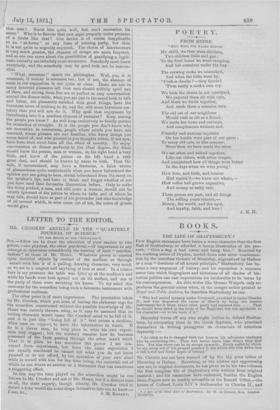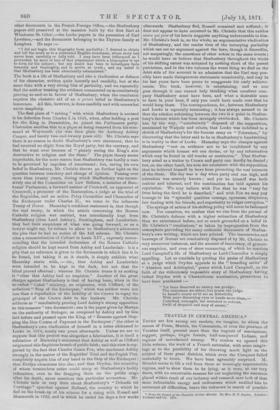BOOKS.
THE LIFE OF SHAFTESBURY.*
FEW English statesmen have borne a worse character than the first Earl of Shaftesbury, or afforded a better illustration of the pro- verb, " Give a dog a bad name and hang him." Knouted by the scathing satire of Dryden, hurled down into utter condemna- tion by the merciless rhetoric of Macaulay, stigmatized by Hallam as a man "destitute of all honest principle," Shaftesbury has be- come a very scapegoat of history, and his reputation a common sewer into which biographers and historians of all shades of his- torical politics can cast imputations too intolerable to be borne by his contemporaries. An able trifler like Horace Walpole only re- produces the general colour when, in the meagre notice printed in Royal and Noble Authors, be describes Shaftesbury as one " Who had canted tyranny under Cromwell, practised it under Charles IL, and who disgraced the cause of liberty by being the busiest instrument for it when every other party had rejected him. . . . That he should have acted in the trials of the Regicides was but agreeable to his character•—or to his want of it."
Macaulay warns off any who might incline to defend Shaftes- bury, by comparing them to the Greek Sophists, who practised themselves in writing panegyrics on characters of notorious depravity
As often as he is charged with one treason his advocates vindicate him by confessing two. They had bettor leave him where they find him. For him there can be no escape upwards. Every outlet by which ho can creep out of his present position is one which lets him down into a still lower and fouler depth of infamy."
Mr. Christie has not been warned off by the big guns either of Macaulay or Hallam. Reverting, as the custom and opportunity now are, to original documents, ho has given us in his two volumes the first complete life of Shaftesbury over written from original research ; and his researches have embraced, besides the English State-Papers now so readily accessible at the Record Office,—the letters of Colbert, Louis XIV.'s Ambassador to Charles II., and
* A We of the Fine FAN of $/utfIestnuw. By W. D. Christie, M.A. London. Macmillan,
other documents in the French Foreign Office,—the Shaftesbury papers still preserved at the mansion built by the first Earl at Wiinborne St. Giles',—the Locke papers in the possession of Earl Lovelace,—and the documents belonging to the Thynne family at Longleat. He says :-
" I did not begin this biography from partiality; I desired to obtain and tell the truth as to a celebrated English statesman, whose story had never been carefully or fully told. I may have boon influenced as I proceeded, by more or less of that attachment which a biographer is apt to form for his subject ; but my desire has been to investigate facts honestly and thoroughly, and to arrive at truth ; and my belief is that Shaftesbury has been abominably calumniated:,
The book is a life of Shaftesbury and also a vindication or defence
of his character, written quite honestly and candidly, but at the same time with a very strong bias of partiality, and we repeatedly find the author treating the evidence commented on as conclusively proving so-and-so in favour of Shaftesbury, when the conclusion requires the obstetric aid of an a priori belief in Shaftesbury's
innocence. All this, however, is done candidly and with somewhat naive simplicity.
The first piece of " ratting " with which Shaftesbury is accused
is his defection from Charles I. in 1643, when, after holding a post for the King in Dorsetshire, he joined the Parliament party. Clarendon ascribes this to a pique at being removed from his com- mand at Weymouth (he was then plain Sir Anthony Ashley Cooper, and barely two-and-twenty years old). Mr. Christie says there is no reason to doubt Shaftesbury's own statement, that he had received no slight from the Royal party, but the contrary, and
that he went over because of " plainly seeing the King's aim destructive to religion and the State." The pique theory seems improbable, for the mere reason that Shaftesbury was hardly a man to be governed by impulses of resentment ; but, saving his own belief in Shaftesbury, Mr. Christie throws no further light on the
question between treachery and change of opinion. Passing over more than twenty years, during which Shaftesbury was succes- sively one of the Committee on Law Reform, a member of Bare- bones' Parliament, a forward assister of Cromwell, an opponent of
Cromwell, a promoter of the Restoration, a judge at the trial of the Regicides, and an active Privy Councillor and Chancellor of the Exchequer under Charles 11., we come to the infamous Treaty of Dover. Macaulay's confident statement is, that though the real treaty, in which the article concerning the Roman
Catholic religion was omitted, was intentionally kept from Shaftesbury (then Lord Ashley), Buckinghans, and Lauderdale, they had their suspicions of what was going forward, or as a lawyer might say, he refuses to allow to Shaftesbury's advocates the plea that he had no notice of the full scheme. Mr. Christie
cites a communication of Colbert to Louis XIV., expressly recom- mending that the intended declaration of the Roman Catholic religion should be kept secret from Ashley and Lauderdale : it is a pity that no reference is given to the documents in which this is to be found, but taking it as it stands, it simply exhibits what Macaulay starts with, — viz., that Ashley and Lauderdale
were intended to be kept in the dark, but not that the blind proved effectual ; whereas Mr. Christie treats it as making it " clear that Ashley had no suspicion." Another of the great charges against Shaftesbury is that of having been, when in the so-called " Cabal " ministry, an originator, with Clifford, of the nefarious " Stop of the Exchequer," which was neither more nor less than a repudiation of the liability of the Crown to repay the principal of the Crown debt to the bankers. Mr. Christie
adduces as " conclusively proving Lord Ashley's strong opposition to this measure " two documents ; one is the paper given by Martyn on the authority of Stringer, as composed by Ashley and by him laid before and pressed upon the King, of " Reasons against Stop- ping the Due Course of Payment in the Exchequer ;" the other is
Shaftesbury's own vindication of himself in a letter addressed to Locke in 1674, nearly two years afterwards. Unless we are to
suppose that this protest was altogether a fabrication, it is itself a refutation of Macaulay's statement that Ashley as well as Clifford originated this flagitious breach of public faith; and this view is sup- ported by the fact that Charles James Fox, who condemns Ashley strongly in the matter of the Regicides' frial and the Popish Plot, completely acquits him of any hand in the Stop of the Exchequer ; that Evelyn exonerates him also ; and that Dryden, the scurrility of whose tremendous satire could stoop at Shaftesbury's bodily infirmities, even to the dragging them on the public stage after his death, never mentions this particular accusation. Mr. Christie tells us very little about Shaftesbury's " Delenda eat Carthago" speeches against Holland, the country to which he fled on the break-up of his scheme for a rising with Russell and Monmouth in 1682, and in which he ended his days a few weeks afterwards. Shaftesbury fled, Russell remained and suffered ; it
does not appear to have occurred to Mr. Christie that this sudden sauce qui peat of his hero's suggests anything unfavourable to him.
Mr. Christie's book is, on the whole, an argumentative vindication of Shaftesbury, and the reader tires of the unvarying partiality which can see no argument against the hero, though it discredits, not unsparingly, the assertions of other actors in the same events ; he would have us believe that Shaftesbury throughout the whole of his shifting career was actuated by nothing short of the purest patriotism, and in the two volumes the worst thing we find on the debit side of the account is an admission that the Earl may pos- sibly have made disingenuous statements occasionally, and may itt
his last years have been prone to exaggerate his early achieve- ments. The book, however, is entertaining, and as one goes through it one cannot help thinking what excellent com- pany Shaftesbury must have been, and what a desirable man to have in your boat, if only you could have made sure that he would keep there. The correspondence, &c., between Shaftesbury and Locke is especially interesting ; it has always seemed to us that the relation subsisting between the two is a point in Shaftes- bury's favour which has been strangely overlooked. Mr. Christie•
has, by the way, " conclusively " disposed of the supposition,. mentioned by Walpole and others, that Locke was indebted to w sketch of Shaftesbury's for the famous essay on "Toleration," by- discovering that the letter said to be in Shaftesbury's hand writing- is in reality in that of Locke. Macaulay says the charges against Shaftesbury "rest on evidence not to be invalidated by any arguments which human wit can devise, or by any information which may be found in old trunks or escritoires." That Shaftes-
bury acted as a traitor to Crown and party can hardly be denied but, on the other hand, his acts are consistent with the supposition that he believed himself to have been promoting the real interests
of the State. His day was a day when party zeal ran high, au& toleration was scarcely known ; and yet he himself was both zealous and tolerant, and the combination has told against hisx reputation. We may believe with Fox that he was "very far from being the devil he is described," and with Fox we may pay homage to his " splendid qualities courage, openness, eloquence, fair dealing with his friends, and superiority to vulgar corruption.' The springs of action of his shifting policy will never be fathomed' now. For ourselves, we confess that we rise from the perusal of Mr. Christie's defence with a higher estimation of Shaftesbury
than we entertained before, not so much grounded on a belief in Mr. Christie's "conclusions," as taken by impregnation from the atmosphere pervading the many authentic documents of Shaftes- bury's own writing, which are here printed. The inaccuracies and hearsays of Burnet are conclusively disposed of by Mr. Christie in. very numerous instances, and the amount of inaccuracy, of gratuit- ous suspicion, and even of sheer romancing, of which he convicts Lord Campbell's life of Shaftesbury as Lord Chancellor is simply, appalling. Let us conclude by quoting the praise of Shaftesbury, as a judge which Dryden appends to the " branding satire" of
" Absalom and Achitophel," praise which Lord Campbell, on the faith of the ridiculously impossible story of Shaftesbury having, bribed Dryden with a Charterhouse nomination, pronounces to have been purchased :-
" Yet fame deserved no enemy can grudge ; The statesman wo abhor, but praise the judge. In Israel's courts no'er sat an Abbothdin With more discerning eyes or hands more clean,— Unbribed, unsought, the wretched to redress, Swift of despatch and easy of access."































 Previous page
Previous page